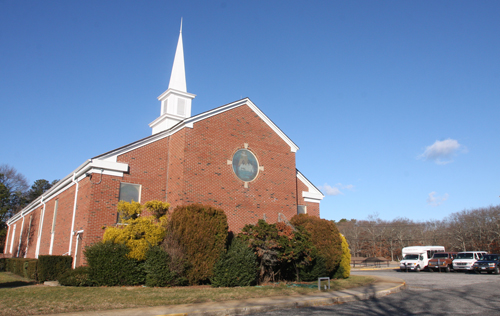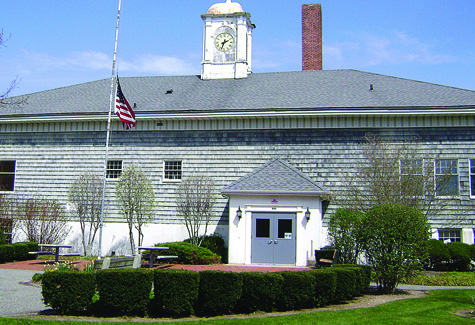Election 2024: Meet the candidates: State Assembly District 2 – Jodi Giglio

Following redistricting changes in 2022, New York’s 2nd Assembly District no longer includes the Town of Southold but instead encompasses Riverhead, Calverton, Shoreham, Wading River and parts of Manorville and extends all the way to Mount Sinai. Tricia Chiaramonte of Manorville will be listed as the Democratic challenger on the November ballot, however the Suffolk County Democratic Committee confirmed that she is not running an active campaign. Therefore, she could not be contacted to arrange a conversation with the News-Review editorial board.
Jodi Giglio (R-Baiting Hollow)
With her current term in the Assembly ending in January, Ms. Giglio is running for reelection for a second time.
Prior to becoming an assemblywoman, she served 11 years on the Riverhead Town Board. When her predecessor in the Assembly, Anthony Palumbo, ran for state Senate in 2020, she launched her campaign and won his former seat. She won her first reelection campaign in November 2022.
Ms. Giglio currently serves on the Assembly’s governmental employees, labor, transportation and people with disabilities committees and on the Joint Legislative Women’s Caucus.
A builder by trade, Ms. Giglio said her experience confronting government officials during a dispute over a 146-acre East Quogue property her company owned is what motivated her to run for public office.
“[The Southampton Town government] put me in a moratorium for two and a half years, raised my property taxes from $80,000 to $400,000, and then locked [my operations] up for two and half years, where I had to sell things that I own just to pay the bank,” she said. “That ticked me off.”
When her company sought to build in downtown Riverhead to address blight in the area, she said she had a difficult time getting through to the town supervisor and Town Board, so she decided to run for a council seat herself.
“In Riverhead, and in this area, people are very active; they’re boisterous and they want their voices heard,” Ms. Giglio said. “I believe in local control, stopping the unfunded [New York State] mandates and pushing it down to the local governments because we have different scenarios here than they do in New York City.”
Ms. Giglio outlined her priorities if reelected, which include reducing costs for taxpayers, eliminating wasteful state spending, advocating for educational funding and farmland preservation and combating public consumption of recreational marijuana.
On renewable energy and the environment: As a member of the Committee on Environmental Conservation, Ms. Giglio wants to continue to be a steward for the voluntary reduction of household trash. She opposes a recent update to New York’s Bottle Bill, which would double the five-cent returnable deposit to 10 cents, arguing that raising the price of redemption does not address the problem of reducing waste and would instead costs her constituents more money.
As for the completion of the South Fork wind project earlier this year, Ms. Giglio expressed concern about the “ambitious goals” the state has for renewable energy and what the costs could mean for ratepayers.
“One of the things that I pushed for at the energy hearings was that there should be a separate line on the utility bill as to how much of their bill is going towards renewable energy, so the people that are paying the bills actually know where that money is going,” she said. “[The rate increases] are making it less affordable to live here, not more affordable, and for businesses and manufacturers also.”
Ms. Giglio said she does support expanding wind, solar and other renewable energy resources as well as increasing use of natural gas, but said it’s important that the oversight of these initiatives doesn’t “fall through the cracks” so the costs become a burden to taxpayers. She noted that electrifying railroad service would be a better use of state funds than focusing on installing more wind turbines and solar farms. One aspect of the electrification proposal that gives her pause, she said, is the potential return of an MTA tax.
On affordable housing and water quality: When it comes to affordable housing, Ms. Giglio emphasized the need to ensure it benefits people who currently live and work in the region, not those who come from other parts of the state. She also shared concerns about how clean water projects may impact the cost of living and how the lack of affordable housing is affecting recruiting and retention of volunteer firefighters .
“A lot of people are finding it very hard to live out here, and another eighth of a percent sales tax on top of all their goods that they buy may seem like a little bit to everybody else, but it’s still more than what they’re paying now,” Ms. Giglio said, referring to a proposed .08% added county sales tax to fund public and private wastewater management improvements. [This tax proposal is up for public vote, listed as Proposition 2 on the Nov. 5 ballot.] “That’s why I get concerned when we talk about clean water projects and things of that nature, but it has to happen in some way.”
She voted down a proposed bill on short-term rental registration, which would amend property and tax laws to require the registration and regulation of short-term residential rental units across the state.
Calling the proposal a “money grab,” Ms. Giglio noted that she has consistently pushed back on shortterm rentals, including during her tenure on the Riverhead Town Board.
She described it as a quality of life issue for residents who live in the community year round.
“You don’t want a new neighbor every weekend. You don’t want somebody putting out the trash on a Sunday night when it doesn’t get picked up until Tuesday. You don’t want loud parties from weddings and things in a house next door to you,” she said.
On open space preservation: Ms. Giglio supports preserving area farmland, but said the community needs to understand that there needs to be a balance with development. She noted that is becoming “harder and harder” for farmers to maintain a business due to changes in the environment that impact their crops and the rapidly rising cost of land.
For some in the agricultural industry, it may often be more economically viable to sell their property, she added.
“We need to preserve farmland, I couldn’t agree more, but it also has to do with what is the best use for the property,” Ms. Giglio said. “I’m really worried about our farms because if there are no farms, there is no food.”
On education: Ms. Giglio has been a staunch advocate for school aid and voted in support of several education-related bills this year, including adding art and music programs to the curriculum for public school students, expanding the New York State College Choice Tuition Savings Program to allow families to use funds for elementary and secondary tuition costs at their school of choice and increasing the minimum Universal Pre-Kindergarten reimbursement rate from $5,400 to $6,400, with annual increases to keep up with inflation.
She rallied with other Republican legislators against state budget cuts to school aid this past year and advocated for a bill that would mandate the appointment of a school district and labor union representative to Industrial Development Agency boards in New York State.
“IDAs are important, they serve a purpose, but people also want to see the difference,” she said. “I think it’s important that labor and school districts be on [the boards] because the cost to educate is becoming higher and higher as the state pulls back the foundation aid.”









